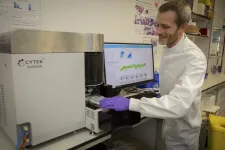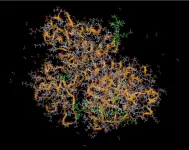(Press-News.org) Sepsis patients could be treated based on their immune system’s response to infection, not their symptoms.
New research uncovers how different people respond to sepsis based on their genetic makeup, which could help identify who would benefit from certain treatments and lead to the development of targeted therapies.
The team, from the Wellcome Sanger Institute, the University of Oxford, and collaborators, built on their previous work that identified different subgroups of patients with sepsis. They aimed to understand more about why sepsis response varies between patients and the different underlying immune response pathways.
The new study, published today (18 June) in Cell Genomics, details the genetic basis of variability in sepsis response, and the different regulators and cell types involved in the different immune responses in each subgroup of patients.
Having a more detailed understanding of sepsis at a molecular level could identify those who would benefit from different therapies, helping to design rapid tests, organise clinical trials, and develop targeted treatments based on the individual immune response.
The ultimate aim is for patients to receive the most effective treatment for their sepsis more quickly, based on their immune response rather than their symptoms. In the future, this approach to personalised medicine could also be applied to other less severe infections, not just sepsis.
Sepsis causes an estimated 11 million deaths worldwide per year, with one death every three seconds. In the UK alone, at least 245,000 people are affected by sepsis, and 48,000 people die each year.1
Sepsis arises when the body has an extreme response to an infection and injures its own tissues and organs. Sepsis can cause different downstream immune responses in different people. Depending on this immune response, the treatment varies. However, it is difficult to identify which response is happening based on symptoms alone. Sepsis can progress quickly, and if the wrong treatment is given, valuable time could be lost.
Previously, researchers from the Wellcome Sanger Institute, the University of Oxford and collaborators, identified how expression of a small set of genes allowed them to categorise who was most at risk from poorer outcomes from sepsis and COVID-192.
Building on their previous work, in this new study the team investigated the impact of genetic variants that regulate gene expression, known as expression quantitative trait locus, or eQTLs. This provides insight into how an individual’s genetic makeup could influence the way they respond to sepsis. This information can help classify who would benefit from targeted therapies, which act on the immune system in different ways.
The team analysed data from the UK Genomic Advances in Sepsis (GAinS) study that contained 1,400 patients with sepsis due to community-acquired pneumonia and faecal peritonitis3 from intensive care units across the UK.
They found that genetic variation in groups of patients is associated with differences in immune response during sepsis. They then used this to identify key genetic regulators in each group, helping to describe what biological networks, cells, and mechanisms are involved in each response.
Understanding the regulatory networks underlying the different patient responses provides additional information for developing treatments that work with the immune system and are a step towards a personalised medicine approach to treating sepsis.
In related research, rapid tests that identify different subtypes of sepsis are also being developed by Dr Julian Knight at the University of Oxford4. These aim to quickly show those who would benefit from targeted treatments.
The next steps would be to further investigate the immune response to find targeted treatments for each immune response or different stages of the immune response.
Dr Katie Burnham, first author from the Wellcome Sanger Institute, said: “Our study is the next step towards being able to treat sepsis based on someone's genetics and their particular immune response, instead of their symptoms, which can vary greatly from person to person. Our research found two groups of people, with opposite immune responses, and identified the genetic regulators involved. Being able to molecularly categorise patients with sepsis allows clinicians to correctly identify who could benefit from the available treatments and gives new direction to those developing targeted therapies.”
Dr Julian Knight, co-senior author from the University of Oxford, said: “Understanding who is at greater risk from sepsis and how they respond to the disease is a huge task. Research such as this, that dives deeper into the molecular basis of the disease, aids in the ongoing development of tests that could identify different subtypes of sepsis and allow medical professionals to treat this straight away. Our research can be directly translated into the clinic and we hope that it allows us to start to develop an efficient, targeted approach to treating this life-threatening disease.”
Dr Emma Davenport, co-senior author from the Wellcome Sanger Institute, said: “Sepsis is a complicated and devastating disease that impacts millions of people around the world each year. Understanding the molecular processes that happen during sepsis, and how genetics plays a role in this, can help give answers to long-standing questions, improve patient outcomes, and allow for the development of effective clinical trials that lead to new targeted treatments as quickly as possible.”
ENDS
Contact details:
Rachael Smith
Press Office
Wellcome Sanger Institute
Cambridge, CB10 1SA
+447827979492
Email: press.office@sanger.ac.uk
Notes to Editors:
The UK Sepsis Trust. Available at https://sepsistrust.org/about/#:~:text=Every%203%20seconds%2C%20someone%20in,11%20million%20lives%20a%20year.
https://www.sanger.ac.uk/news_item/sepsis-and-covid-19-patients-most-at-risk-predicted-with-genetic-model/
Community-acquired pneumonia is when someone catches pneumonia outside of a healthcare setting, while in the community. Faecal peritonitis is when the thin layer of tissue inside the abdomen becomes infected by faecal matter.
This work is in partnership with the Danaher Corporation. More information can be found here: https://oxfordbrc.nihr.ac.uk/partnership-with-danaher-paves-way-for-precision-medicine-test-for-sepsis/
Publication:
K. Burnham, N. Milind, W. Lee, et al. (2024). eQTLs identify regulatory networks and drivers of variation in the individual response to sepsis. Cell Genomics. DOI: https://doi.org/10.1016/j.xgen.2024.100587
Funding:
This research was funded by Wellcome, the Medical Research Council, and the Winston Churchill Foundation. A full acknowledgement list can be found in the publication.
Selected websites:
The Wellcome Sanger Institute
The Wellcome Sanger Institute is a world leader in genomics research. We apply and explore genomic technologies at scale to advance understanding of biology and improve health. Making discoveries not easily made elsewhere, our research delivers insights across health, disease, evolution and pathogen biology. We are open and collaborative; our data, results, tools, technologies and training are freely shared across the globe to advance science
Funded by Wellcome, we have the freedom to think long-term and push the boundaries of genomics. We take on the challenges of applying our research to the real world, where we aim to bring benefit to people and society.
Find out more at www.sanger.ac.uk or follow us on Twitter, Instagram, Facebook, LinkedIn and on our Blog.
About Wellcome
Wellcome supports science to solve the urgent health challenges facing everyone. We support discovery research into life, health and wellbeing, and we’re taking on three worldwide health challenges: mental health, infectious disease and climate and health. https://wellcome.org/
END
Sepsis patients could get the right treatment faster, based on their genes
2024-06-18
ELSE PRESS RELEASES FROM THIS DATE:
Odors are encoded in rings in the brain of migratory locusts
2024-06-18
The migratory locust Locusta migratoria is an economically important crop pest that is said to have come to Egypt in the Old Testament as the eighth of the ten biblical plagues, "to devour all that plants that grow". The migratory locust is rarely found in Europe, but in Africa and Asia it not only causes millions of dollars’ worth of damage but also has a deadly impact on local people, threatening their food and their very existence. The locusts occur in two phases: as solitary animals and in swarms. The insects are most feared when they ...
New global research aims to improve survival rates for pancreatic cancer patients
2024-06-18
A new study published today in JAMA Network Open by an international cohort of researchers provides the latest data on the effectiveness of treating pancreatic cancer patients with chemotherapy (with or without radiation therapy) before surgery to remove a tumor. The study focuses specifically on pancreatic adenocarcinoma patients.
The research found that after treatment and surgery, nearly five percent of patients had no detectable cancer cells left in the area where the tumor was, achieving a pathological complete response (pCR).
“PCR means that the cancer has responded extremely well to the treatment, leaving no ...
Medication treatment for opioid use disorder offered at only a third of outpatient mental health facilities
2024-06-18
Only a third of outpatient community mental health treatment facilities in 20 states with the highest opioid related overdose deaths report offering medication treatment for opioid use disorders, suggesting efforts may be needed to strengthen such services, according to a new RAND study.
Among the 450 clinics surveyed, factors that increased the likelihood that clinics would provide medication for opioid use disorders included being a certified behavioral health clinic and providing integrated mental and substance use disorder treatment.
Researchers found that most clinics that did not offer medication treatment said they referred patients to other clinics for ...
Salk scientist Jesse Dixon named 2024 Pew Biomedical Scholar
2024-06-18
LA JOLLA (June 18, 2024)—Salk Institute Assistant Professor Jesse Dixon has been named a 2024 Pew Biomedical Scholar by The Pew Charitable Trusts. This honor provides funding to early-career investigators who demonstrate outstanding promise in science toward advancing human health. Dixon and the other 21 awardees will each receive $300,000 over four years to support their research.
“Through his development and use of leading-edge genetic tools, Jesse has already made a major impact on how we study diseases such ...
Pew supports 22 researchers leading scientific innovation
2024-06-18
PHILADELPHIA—The Pew Charitable Trusts today announced the 22 researchers who have been selected to join the Pew Scholars Program in the Biomedical Sciences. These early-career scientists will receive four years of funding to explore some of the most pressing questions in human health and medicine.
“Pew believes that supporting promising early-career researchers is key to scientific innovation, and for nearly 40 years our scholars have helped change the world—creating lifesaving therapies and responding to emerging health crises around the globe,” ...
Discovery of ‘new rules of the immune system’ could improve treatment of inflammatory diseases, say scientists.
2024-06-18
Scientists at the University of Cambridge have discovered that a type of white blood cell - called a regulatory T cell - exists as a single large population of cells that constantly move throughout the body looking for, and repairing, damaged tissue.
This overturns the traditional thinking that regulatory T cells exist as multiple specialist populations that are restricted to specific parts of the body. The finding has implications for the treatment of many different diseases – because almost all diseases and injuries trigger the body’s immune system.
Current anti-inflammatory drugs treat the whole ...
5 Pew-Stewart Scholars chosen to advance innovative cancer research
2024-06-18
PHILADEPHIA—The Pew Charitable Trusts and the Alexander and Margaret Stewart Trust announced today the 2024 class of the Pew-Stewart Scholars for Cancer Research, five early-career scientists who will each receive four-year grants to explore new avenues in cancer development, diagnosis, and treatment. This is the 11th year the Alexander and Margaret Stewart Trust has partnered with Pew to cultivate a legacy of cutting-edge cancer research.
“Despite decades of groundbreaking research and innovative breakthroughs, millions of Americans are still all too familiar with the devastation and uncertainty of a cancer diagnosis,” ...
Pew funds 10 Latin American scientists conducting biomedical research
2024-06-18
PHILADELPHIA—The Pew Charitable Trusts today announced the 2024 class of the Pew Latin American Fellows Program in the Biomedical Sciences.
The 10 postdoctoral fellows from six Latin American countries—Argentina, Brazil, Chile, Cuba, Mexico, and Peru—will receive two years of funding to conduct research in laboratories across the United States. They will work under the mentorship of prominent biomedical scientists, including alumni from the Latin American fellows program and the Pew Scholars Program in the Biomedical Sciences.
“The grave threats to human health over the past few years—from COVID-19 to growing rates of cancer in younger adults—underscore ...
Accelerating drug discovery with the CCDC, AWS, and Intel
2024-06-18
Thanks to the combined computing power of Amazon Web Services (AWS) and Intel, the CCDC announces that a potentially significant advancement in drug discovery has been achieved. A curated data set of protein structures from the Protein Data Bank (PDB) with predicted hydrogen positions is now available for download. This project was supported by an Intel RISE Technology Initiative contribution.
Historically, collaborations with the pharmaceutical industry have enabled the development of reliable methods for interpreting interactions within protein binding sites using proprietary information not publicly available. Repeating these studies ...
Updates from the 2022 WHO classification of kidney epithelial tumors
2024-06-18
Renal tumor pathology has evolved considerably, expanding from two main types of renal malignant tumors to over 20 distinct types. Diagnostic criteria have advanced from purely morphological features to include histochemistry, immunohistochemistry (IHC), and molecular genetics. The World Health Organization (WHO) and the International Society of Urologic Pathology (ISUP) have been instrumental in updating these criteria, resulting in a comprehensive framework essential for accurate diagnosis, effective treatment, and improved patient outcomes.
The field of renal tumor pathology has undergone ...



